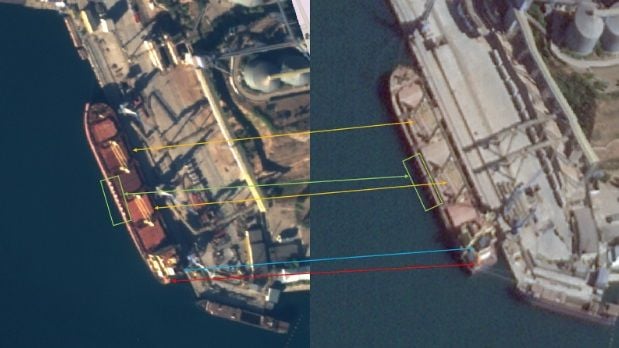Russian Ship from Crimea Unloads Cargo at Houthi Port

Yemen Monitor/Sanaa/Exclusive:
A journalistic investigation has revealed that a Russian-owned and flagged cargo ship, which routinely docks in Moscow-controlled Crimea, has received UN approval to unload its cargo at the Houthi-controlled port Al-Saleef in Al-Hodeidah.
The investigation was conducted by Lloyd’s List and Bellingcat and was published on both websites on Friday.
Lloyd’s List added: The shipment, which was effectively given a UN stamp of approval to a trade from one internationally contested region to another, has raised questions over the veracity of the UN-led approval mechanism and allowed Russia to further its stated goal of expanding grain exports from occupied territories.
It added: The bulk carrier ZAFAR, carrying grain, which has been an active participant in the growing fleet of Russian-controlled ships transporting goods out of Russian-occupied Ukrainian ports since September 2023, loaded a cargo of grain in Sevastopol in May of this year under the cover of a gap in its Automatic Identification System (AIS) being operational.
It continued: It then sailed for Djibouti, where it received clearance by the UN Verification and Inspection Mechanism for Yemen to proceed to the Houthi-controlled port Saleef, where it arrived on June 30.
It continued: To complete this trade, the ZAFAR had to obtain approval from the UN Verification and Inspection Mechanism (UNVIM) – the body that approves shipments to Yemeni ports not under government control.
Satellite imagery revealed the ship’s presence at the port.
The ZAFAR arrived in Al-Saleef just two days before a Houthi delegation visited Moscow in early July, where issues including the Yemeni war were discussed.
The Russian government and the Ministry of Foreign Affairs did not respond to emailed questions about the shipment prior to publication, nor did the operator of ZAFAR.
Bellingcat said it was unclear whether the UN Verification and Inspection Mechanism was aware that the cargo came from the occupied Crimean Peninsula, given that the ZAFAR sought to conceal the fact that it was heading there.
It added: While there is no indication that this shipment was illegal, experts say it creates an awkward situation where the UN mechanism has approved a shipment of grain from occupied Ukrainian territory despite Russia’s ongoing invasion of Ukraine and the fact that member states have voted repeatedly against Russia’s actions towards its neighbor.
It was not clear exactly where the grain carried by the ship ZAFAR to Yemen was harvested, but some farmers in eastern Ukraine under Russian control have previously accused Russian forces of stealing grain that was later exported.
Yemen is one of the poorest countries in the world. A decade-long civil war between the internationally recognized government backed by Saudi Arabia and Houthi forces backed by Iran has killed thousands and created a humanitarian crisis. The UN High Commissioner for Refugees says millions have been displaced and there is a risk of widespread famine.
Daniel Martin, a partner at Holman Fenwick Willan, a law firm specializing in international trade sanctions, told Lloyd’s List: “If you look at this from the perspective of global policy goals of getting food into Yemen and preventing weapons from entering, the UN Verification and Inspection Mechanism is fulfilling its mandate.”
He added, “But if you look at the bigger picture, it is likely that Western states would prefer this to happen without enriching sanctioned states.”
Material on the UNVIM website outlines that it has received “voluntary contributions and active support” from the likes of the EU, US Department of State, USAID and the Ministry of Foreign Affairs for the Netherlands since it was set up in 2015.




